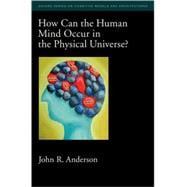
Note: Supplemental materials are not guaranteed with Rental or Used book purchases.
Purchase Benefits
What is included with this book?
| Cognitive Architecture | p. 3 |
| The Modular Organization of the Mind | p. 45 |
| Human Associative Memory | p. 91 |
| The Adaptive Control of Thought | p. 135 |
| What Does It Take to Be Human? Lessons From High School Algebra | p. 187 |
| How Can the Human Mind Occur? | p. 237 |
| References | p. 249 |
| Author Index | p. 275 |
| Subject Index | p. 283 |
| Table of Contents provided by Ingram. All Rights Reserved. |
The New copy of this book will include any supplemental materials advertised. Please check the title of the book to determine if it should include any access cards, study guides, lab manuals, CDs, etc.
The Used, Rental and eBook copies of this book are not guaranteed to include any supplemental materials. Typically, only the book itself is included. This is true even if the title states it includes any access cards, study guides, lab manuals, CDs, etc.